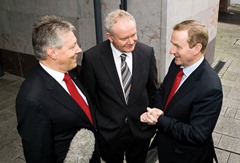NSMC nears 15-year mark
 As the North/South Ministerial Council approaches its 15th anniversary, Michael McKernan assesses the reasons for its limited progress.
As the North/South Ministerial Council approaches its 15th anniversary, Michael McKernan assesses the reasons for its limited progress.
The decision by unionists to pull out of the plenary session of the North/South Ministerial Council (NSMC) scheduled for Dublin on 3 July, which was subsequently cancelled, no doubt achieved its primary political objective of registering with their political opponents deep unionist dissatisfaction over recent parading decisions. It would also have annoyed the nationalist parties generally who regard the NSMC, both as an institution and in its day-to-day work to develop North/South co-operation, as an essential part of the Belfast Agreement.
Yet for a supposed cornerstone of the historic settlement and an organisation that has been up and running for almost 15 years, it is not obvious where the NSMC has made any major political impact. Its primary function is to manage the inter-governmental North/South bureaucracy and formal meetings scheduled around 12 sectors of co-operation.
The sectors comprise the work of six cross-border implementation bodies and six other separate areas of co-operation. NSMC meets twice yearly in plenary format (cabinet-to-cabinet) and then much more frequently in sectoral format addressing the issues developing in the 12 sectors. The NSMC also considers North/South arrangements generally when meeting in institutional format, including the reviewing of North/South aspects of the St Andrews Agreement.
From the very outset, the NSMC secretariat has been conscious of unionist suspicion towards its work and has adopted a cautious, ultra-patient approach to North/South development. It has endeavoured to demonstrate that North/South co-operation posed no political threat nor competition to any of the existing institutions of government.
Therefore as regards the six cross-border implementation bodies covering trade development, inland waterways, tourism, food safety, languages and loughs, the NSMC has co-ordinated their work and ensured close ministerial oversight.
The result is that the bodies have had their roles so tightly defined that in addition to knowing what they are expected to do, they are just as clear about what they don’t do. One example is where the trade development body (InterTradeIreland), which at the outset looked like becoming a major player in the all-island economy, has now had its role largely confined to the provision of trade information services and the establishment of cross-border business networks.
As regards the six other sectors – agriculture, education, environment, health, tourism and transport – where NSMC has no actual implementation role, co-operation has been growing in some areas and remains minimal in others. Although progress depends on individual ministers, the NSMC has nonetheless been an attentive host.
The St Andrews review commenced in 2007 has not been completed. Phase one relating to the performance of the six implementation bodies is complete and the bodies have been capped, in terms of manpower and budgets and their roles limited. The second part of the St Andrews review – to look at new areas for North/South co-operation – has made very little progress.
This is unsatisfactory in areas such as energy policy which lends itself very naturally to an all-island approach. However the overriding political reality is that unionists remain reluctant to see more ‘North/Southery’ while those in favour, including the NSMC secretariat, have not forced the issue.
For all the constraint and foot-dragging, however, the NSMC has matured as a political forum where some strong inter-ministerial relationships have developed and where the stilted, scripted exchanges between ministers of the early days, have given way to genuinely useful discussion.
It is unsurprising therefore, in relation to a quite unusual institution, that any verdict on the NSMC over its 15 years could range, depending on the judge, from declaring it a solid success to labelling it a disappointing failure.





